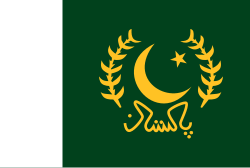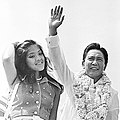Portal:Politics
| Main | Topics and categories | Tasks and projects |
The Politics portal

Politics (from Ancient Greek πολιτικά (politiká) 'affairs of the cities') is the set of activities that are associated with making decisions in groups, or other forms of power relations among individuals, such as the distribution of status or resources. The branch of social science that studies politics and government is referred to as political science.
Politics may be used positively in the context of a "political solution" which is compromising and non-violent, or descriptively as "the art or science of government", but the word often also carries a negative connotation. The concept has been defined in various ways, and different approaches have fundamentally differing views on whether it should be used extensively or in a limited way, empirically or normatively, and on whether conflict or co-operation is more essential to it.
A variety of methods are deployed in politics, which include promoting one's own political views among people, negotiation with other political subjects, making laws, and exercising internal and external force, including warfare against adversaries. Politics is exercised on a wide range of social levels, from clans and tribes of traditional societies, through modern local governments, companies and institutions up to sovereign states, to the international level.
In modern states, people often form political parties to represent their ideas. Members of a party often agree to take the same position on many issues and agree to support the same changes to law and the same leaders. An election is usually a competition between different parties.
A political system is a framework which defines acceptable political methods within a society. The history of political thought can be traced back to early antiquity, with seminal works such as Plato's Republic, Aristotle's Politics, Confucius's political manuscripts and Chanakya's Arthashastra. (Full article...)
Selected article
The Fourth International has been a communist international organisation working in opposition to both capitalism and Stalinism. Consisting of supporters of Leon Trotsky, it has striven for an eventual victory of the working class to bring about socialism. In Paris in 1938, Trotsky and many of his supporters, having been expelled from the Soviet Union, considered the Comintern to have become lost to "Stalinism" and incapable of leading the international working class towards political power. Thus, they founded their own competing "Fourth International". Throughout the better part of its existence, the Fourth International was hounded by agents of the Soviet secret police, repressed by capitalist countries such as France and the United States, and rejected by followers of the Soviet Union and later Maoism as illegitimate - a position these communists still hold today. The FI suffered a split in 1940 and an even more significant split in 1953. Despite a partial reunification in 1963, more than one group claims to represent the political continuity of the Fourth International. The broad array of Trotskyist Internationals are split over whether the Fourth International still exists and if so, which organisation represents its political continuity.
Featured picture

Andrew Gregg Curtin (1817–1894) was a U.S. lawyer and politician. He served as the 15th Governor of Pennsylvania during the American Civil War. During the Civil War, Curtin organized the Pennsylvania reserves into combat units, and oversaw the construction of the first Union military camp for training militia. After the Battle of Gettysburg, Governor Curtin was the principal force behind the establishment of the National Cemetery there. After serving two terms as governor, Curtin was appointed ambassador to Russia by Ulysses S. Grant, and he later served in the House of Representatives from 1881 until 1887.
Selected quote
Selected biography
Richard Nixon (1913–1994) was the 37th President of the United States, serving from 1969 to 1974. He graduated from Whittier College in 1934 and Duke University School of Law in 1937, returning to California to practice law. He served in the United States Navy during World War II. Nixon was elected to the House of Representatives in 1946 and to the Senate in 1950. He served for eight years as vice president, from 1953 to 1961, and waged an unsuccessful presidential campaign in 1960, narrowly losing to John F. Kennedy. In 1968, Nixon ran again for president and was elected. He initially escalated the Vietnam War, but ended U.S. involvement in 1973. Nixon's visit to the People's Republic of China in 1972 opened diplomatic relations between the two nations. Though he presided over Apollo 11, he scaled back manned space exploration. He was re-elected by a landslide in 1972. A series of revelations in the Watergate scandal cost Nixon much of his political support in his second term, and on August 9, 1974, he resigned as president. In retirement, Nixon's work as an elder statesman, authoring several books and undertaking many foreign trips, helped to rehabilitate his public image.
Did you know (auto-generated) -

- ... that Nargess Eskandari-Grünberg, the new mayor of Frankfurt, gave birth to her first child while a political prisoner in the wake of the Iranian Revolution?
- ... that Babydog is "a fixture in West Virginia politics"?
- ... that Walker Keith Baylor, a strong believer in phrenology and physiognomy, determined the fitness of political candidates by measuring their faces and heads with a tape measure?
- ... that Denpasar mayor I Gusti Ngurah Jaya Negara became active in politics after he was laid off from a bank due to the Asian financial crisis?
- ... that the founder of a Mississippi radio station compared selling advertising time to campaigning for political office?
- ... that in the 1916 Declaration of Sainte-Adresse Britain, France and Russia committed to securing the political and economic independence of Belgium after the First World War?
More did you know...
- ...that political opportunity theory explains the rise and decline of social movements by their dependence on outside, political factors?
- ...that impeachment in Norway was used six times in 1814–1845, but only twice since?
- ...that The Mass Psychology of Fascism, a book written by Wilhelm Reich in 1933, blamed sexual repression for the rise of fascism?
- ...that, at a congress in May 1921, all Socialist Party of Romania delegates who supported Bolshevik guidelines were arrested 24 hours after a vote on affiliation to the Comintern?
- ...that Ngo Dinh Diem became president of South Vietnam after a fraudulent 1955 election run by his brother Ngo Dinh Nhu, polling 133% of registered voters in Saigon?
- ...that the Brothers Grimm were amongst the Göttingen Seven, university teachers who protested changes to the constitution of the Kingdom of Hanover in 1837?
- ...that depending on a time and place, the same social movement may be revolutionary or not?
- ...that during the Sixth Congress of the Cuban Communist Party, Raúl Castro proposed term limits for the country's leaders?
In this month
- June 28, 2004 - Canadian federal elections occur; the Liberal party loses its absolute majority.
News and Current events
- August 11: 4 local government areas in New South Wales, Australia locked down after COVID-19 case
- August 11: Australia: AstraZeneca vaccine access expanded by Victorian government
- August 1: Australia: Victorian lockdown lifted
- July 29: Tunisia's president dismisses prime minister, suspends parliament
- July 25: Australia: Wikinews interviews Reg Kidd, mayor of the City of Orange, about COVID-19 lockdown and local government
- July 23: South Australia enters week-long lockdown to contain COVID-19 Delta variant spread
- July 21: Technological University Dublin senior lecturer Dr Lorcan Sirr speaks to Wikinews on housing market in Ireland
- July 21: Three rural councils in New South Wales, Australia enter 7-day lockdown
- July 21: Australia: Victoria lockdown extended by a week with 85 active cases recorded
- July 15: California governor signs new state budget, eligible Californians to get stimulus payments
Topics and categories
General images
Related portals
Associated Wikimedia
The following Wikimedia Foundation sister projects provide more on this subject:
-
Commons
Free media repository -
Wikibooks
Free textbooks and manuals -
Wikidata
Free knowledge base -
Wikinews
Free-content news -
Wikiquote
Collection of quotations -
Wikisource
Free-content library -
Wikiversity
Free learning tools -
Wiktionary
Dictionary and thesaurus
































































